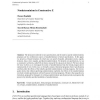Free Online Productivity Tools
i2Speak
i2Symbol
i2OCR
iTex2Img
iWeb2Print
iWeb2Shot
i2Type
iPdf2Split
iPdf2Merge
i2Bopomofo
i2Arabic
i2Style
i2Image
i2PDF
iLatex2Rtf
Sci2ools
121
Voted
FUIN
2008
2008
Nondeterminism in Constructive Z
The abstraction inherent in most specifications and the need to specify nondeterministic programs are two well-known sources of nondeterminism in formal specifications. In this paper, we present a Z-based formalism by which one can specify bounded, unbounded, erratic, angelic, demonic, loose, strict, singular, and plural nondeterminism. To interpret our specifications, we use a constructive set theory, called CZ set theory, instead of the classical set theory Z. We have chosen CZ since it allows us to investigate the notion of nondeterminism from the formal program development point of view. In this way, we formally construct functional programs from Z specifications and then probe the effects of the initially specified nondeterminism on final programs. Our investigation shows that without specifying nondeterminism explicitly, the effects of the nondeterminism involved in initial specifications will not be preserved in final programs. We prove that using the new formalism, proposed by ...
Related Content
| Added | 25 Jan 2011 |
| Updated | 25 Jan 2011 |
| Type | Journal |
| Year | 2008 |
| Where | FUIN |
| Authors | Hassan Haghighi, Seyed-Hassan Mirian-Hosseinabadi |
Comments (0)

